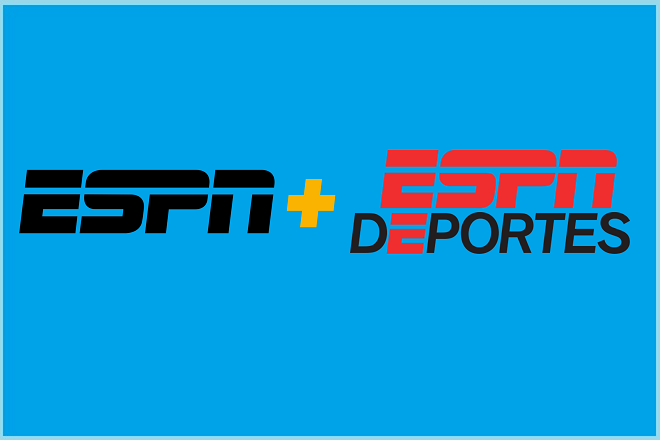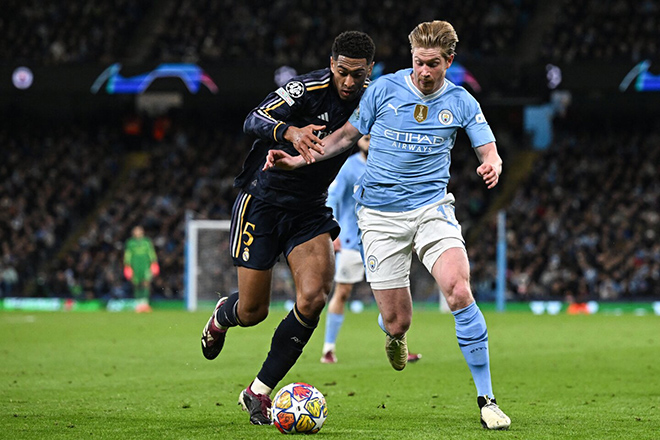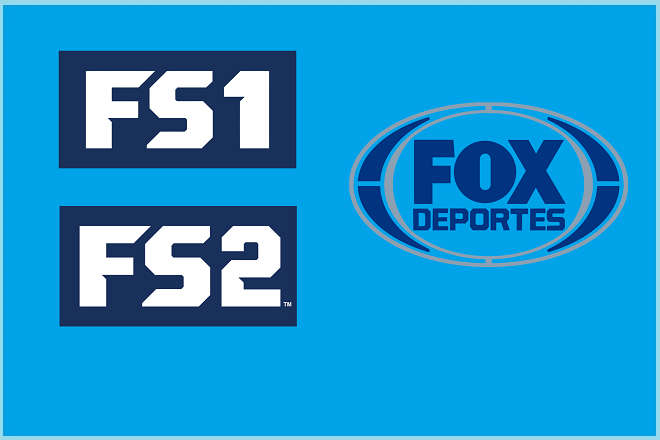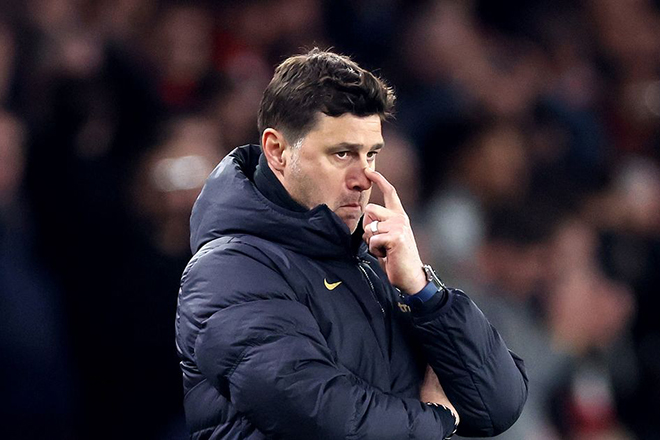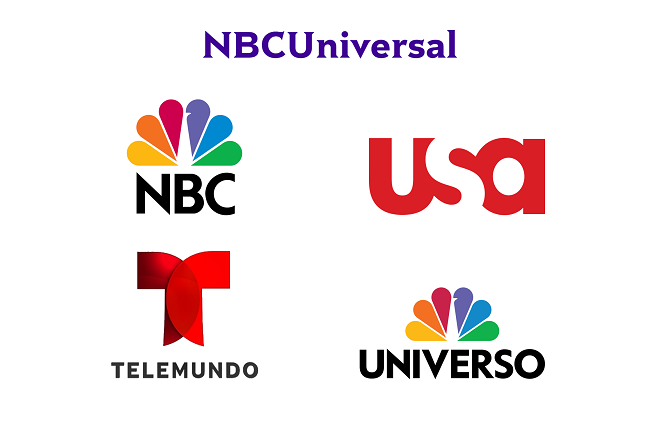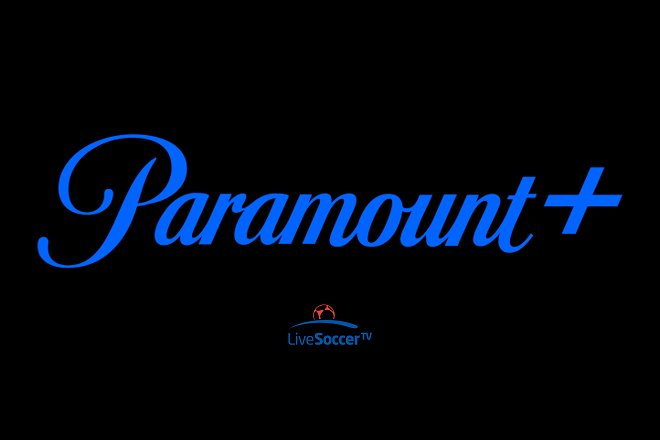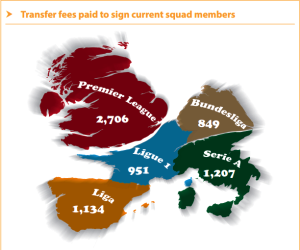 "To win the Champions League, you need a budget of at least €300 million", Bayern Munich legendary goalkeeper Oliver Kahn stated to German publication Kicker when asked his opinion on what it takes for a side to lift European continental football's highest trophy.
"To win the Champions League, you need a budget of at least €300 million", Bayern Munich legendary goalkeeper Oliver Kahn stated to German publication Kicker when asked his opinion on what it takes for a side to lift European continental football's highest trophy.
He then went on to add that it was thanks to their lavish spending that saw Chelsea lift the trophy in 2012, the first in the club's history but conceded that "it doesn't make them any different than Manchester City, Real Madrid, Barcelona, or Bayern Munich".
Still, no one can dispute that since Chelsea's July 2003 takeover by Russian oligarch Roman Abramovich that the Blues have not enjoyed an upswing in success, notably winning the league title three times (their first since the the 1954-1955 campaign).
And of course, the aforementioned Champions League as well as the Europa League the following season.
Certainly this is what Manchester City's new owners had in mind when they purchased the club in 2008.
.png)
Their massive spending paid off in 2012 when the club won the league title for the first time in 44 years ahead of rivals Manchester United. However, while they have tasted domestic success, their continental aspirations have come to a screeching halt over the past couple of seasons, with City failing to get out of the group stages.
This season, though, things have improved, with the team Manchester United fans refer as to their "noisy neighbours" finally breaking that losing streak and qualifying for the knock-out rounds in the Champions League. Interestingly, the Red Devils, despite their significant spending see themselves out of the race to retain their title, as well as are finding it difficult to be in a position to contend for European football next term.
In Italy, big spending does not always equal success, but cost-cutting can also cause misery
.png) Not surprisingly, league leaders Juventus have had to spend in order to stay ahead of the pack, and the Bianconeri's €213.8 million outlay is nearly double the expenditure of second-placed Roma.
Not surprisingly, league leaders Juventus have had to spend in order to stay ahead of the pack, and the Bianconeri's €213.8 million outlay is nearly double the expenditure of second-placed Roma.
However, Inter, who is the second-biggest spender on this list hasn't seen their money produce much results as they are currently fifth in the league and finished in a disappointing ninth last season.
Milan obviously are looking to drastically cut back on spending--but at what cost? The Rossoneri look certain to miss out on the Champions League and even a Europa League berth may be a difficult thing to attain. The seven-time winners have seen their fortunes decline drastically, especially after the sales of Zlatan Ibrahimovic and Thiago Silva to PSG back in the summer of 2012.
The surprise package of the season, Hellas Verona had managed to keep themselves in contention for European football for the first half of this year's campaign--despite spending a minute fraction of what teams like Napoli, Inter, and Juventus have spent. In fact, their under €3 million expenditure is less than the annual salary of many of Serie A's top earners.
Atletico Madrid: Getting some serious bang out of their bucks
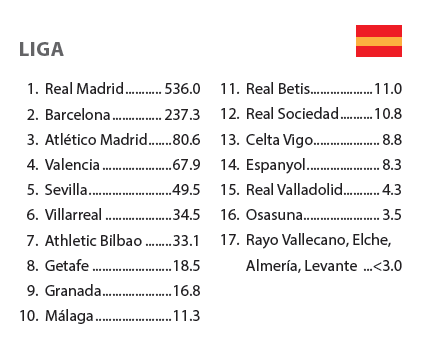 The La Liga race appears to be not only the closest, but also one of the most interesting ones in years. Previously, it was all about perpetual rivals Barcelona and Real Madrid battling it out, whilst the other teams fought for the scraps, but this year it has been comfortably, and intriguingly a three-party race from the beginning.
The La Liga race appears to be not only the closest, but also one of the most interesting ones in years. Previously, it was all about perpetual rivals Barcelona and Real Madrid battling it out, whilst the other teams fought for the scraps, but this year it has been comfortably, and intriguingly a three-party race from the beginning.
And, impressively, Diego Simone's men have not let up following the Christmas holiday, continuing to keep up pressure on Lionel Messi & Co. at the top of the table and staying ahead of their city rivals.
Of course, given the astronomical amount spent on Tottenham's Gareth Bale, as well as having a long standing penchant for splashing the clash, Los Blancos lead with nearly double the outlay of their Catalan rivals. But for a side that has spent a bit more than 1/3rd of the Blaugrana's and an impressive 15% of Los Blancos, would it not be quite interesting if the "other Madrid" team ended up celebrating the league title come May--showing that money doesn't always buy success?
History makers and big dreamers: Bundesliga and Ligue 1 heavyweights not afraid to splash the cash
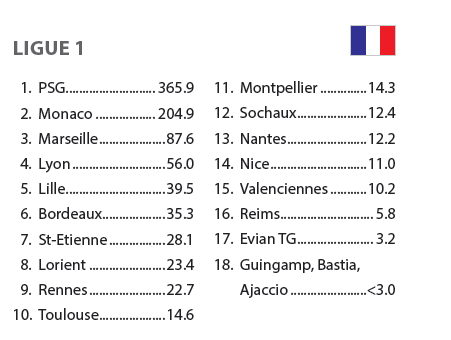 Since their takeover in 2011 by the Qatar Investment Authority, Paris Saint-Germain has gone about establishing themselves as not only a force in France but also aspires to become a big name on the continental arena.
Since their takeover in 2011 by the Qatar Investment Authority, Paris Saint-Germain has gone about establishing themselves as not only a force in France but also aspires to become a big name on the continental arena.
And the spending has paid off--in the form of Les Parisiens claiming their first league title last season since 1994 thanks to the money dished out for the likes of former Serie A stars Thiago Silva, Zlatan Ibrahimovic, Javier Pastore, and Ezequiel Lavezzi.
This season, they have continued acquiring some of Italian football's finest talents, notably Napoli striker and last season's capocannoniere Edinson Cavani in addition to rising young Brazilian defender Marquinhos from Roma.
But for a club whose motto is Rêvons Plus Grand, obviously league domination is not their only goal and certainly the club's hierachy will hope that their investments will pay dividends sooner rather than later. Joining them at the top of the Ligue 1 big spenders is newly promoted side Monaco, who last season was plying their trade in Ligue 2; however thanks to a massive influx of capital from their Russian owner they find themselves just three points behind the Ligue 1 title holders a bit over midway through the season.
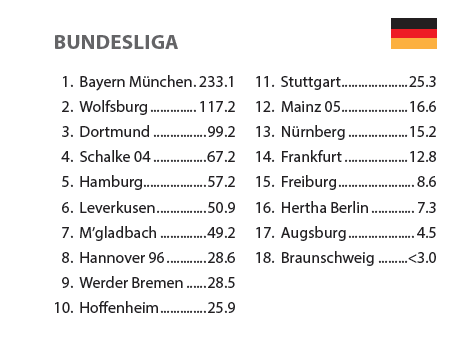 As we are all aware, Bayern Munich made history in 2013 as the first German side ever to clinch the Treble and capped off a fantastic year after winning the Club World Cup (their fifth trophy).
As we are all aware, Bayern Munich made history in 2013 as the first German side ever to clinch the Treble and capped off a fantastic year after winning the Club World Cup (their fifth trophy).
With a seemingly insurmountable 10 point lead in the league, they look a sure bet to retain their title and are favourites to win the Champions League as well.
Their rivals for continental and domestic glory, Borussia Dortmund surprised many when they made it to the finals at Wembley in May. After all, the club's spending power is a bit over 25% that of the Bavarian giants, and appeared to show that there are still Cinderella stories in football.
However, this season, they have struggled to replicate that same form, and it looks certain that die Roten will have no issue in maintaining their standing at the top of German (and possibly European) football.

